Section 21.3. The Participation Economy
21.3. The Participation EconomyThe major challenge faced by every online community is how to get people to participate. Participation requires a balance of give (creating content) and take (consuming content). It's difficult to ensure reciprocity between givers and takers; it's often human nature to lurk and learn, while creating good information takes time and hard work. If everyone consumes and no one produces, online communities fail. Those responsible for online communities therefore have a harder job than Ben Bernanke (the head of the U.S. Federal Reserve Board). Beyond tweaking economic performance, they have an even larger job: to create the economy from scratch. And since they can't force people to participate, a healthy online-community economy must therefore err in the direction of free-market principlesenabling, not overmanagingthe creation of content in a way that keeps up with its consumption. Information architecture comes into play here in two ways. First, it provides a critical set of rules and guidelines that make up part of the economy's infrastructure, much in the same way that the international banking system structures transactions in the global economy. So information architecture is a key part of "setting up" an economy. Second, information architecture can be used to tweak levels of "transactions" in the participation economy, much like the Federal Reserve Board's adjustments to interest rates can invigorate or cool down economic activity. Information architecture greases the participation economy by supporting different levels of content creation that fit with human nature, and by "monetizing" that participation so that members better understand what their content creationand consumptionis worth. 21.3.1. Supporting Different Levels of ParticipationSome sites put up a huge wall that must be scaled in order for users to participate. For example, they may require all sorts of personal information from participants before they're "allowed in." This speakeasy model may work in unique situations, but it generally fails in today's competitive environment of plentiful community venues and sources of content. A better approach is to accommodate the different levels of participation sought by many sorts of people, ranging from the quiet lurkers to the hyperactive gadflies. evolt.org supports different levels of access to its content and other resources. Anyone, member or not, can be involved in evolt.org, but higher levels of participation are accorded to members, and even higher levels to administrators. These social strata are detailed in Table 21-1.
Although this scheme is by no means revolutionary, it does set in place a system of "classes" and a logical migration path that taps people's desire to be "upwardly mobile." Nonmembers get an initial taste of the site that may encourage them to increase their level of participation over time. More classes could be developed, but that would make for too complex and weighty a caste system. evolt.org has judiciously chosen to keep things simple so that users understand which class they belong to and where they can go from there. And the rite of passage from "anyone" to a decision-making member is quick and relatively painless (no tattooing, branding, or other forms of hazing are required). 21.3.2. Capital in the EconomyPerhaps even more interesting is the way that participation is "monetized." The evolt.org economy runs on many types of "money" that take on two major forms: payments made by producers, and payments received by consumers. More specifically, evolt.org's "payments" are transacted through such commonplace actions as posting to a discussion list, writing an article, or creating a personal directory entry, as we describe next. 21.3.2.1. Discussion list postingsWhen someone posts a question, answer, comment, or idea to an evolt.org discussion list, she isn't necessarily conscious of conducting a transaction in evolt.org's participation economy. In fact, such postings are essentially the backbone of the economy, as most people come to evolt.org for the discussions. And, because evolt.org supports four major discussion listseach addressing different aspects of web development and the management of evolt.org itselfthe needs of many types of users are addressed. "thelist" is where evolt.org's raison d'êtreweb developmentis discussed. "theforum" and "thesite" are oriented more toward building and improving evolt.org itself. And "thechat" is the place to take inevitable off-topic conversations. (See Figure 21-1.) Figure 21-1. evolt.org's mailing lists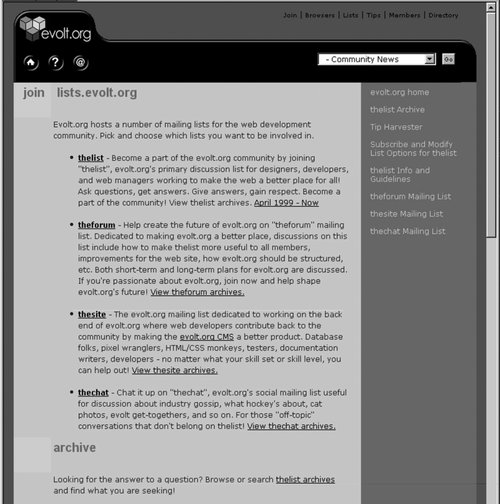 21.3.2.2. TipsBut while evolt.org encourages contributions to its discussion lists, it also must balance quantity with quality. Low signalnoise ratio is probably the leading cause of list collapse, so evolt.org uses a variety of methods and guidelines to maintain quality in its discussion-list postings (see Figure 21-2). While it can't force posters to stay on topic, it does ask them to prefix their subject lines with the warning "[OT]" (for Off-Topic) when necessary. That way, a reader can quickly scan a subject line and spot an off-topic posting without having to read the full posting. Figure 21-2. Guidelines for participating in evolt.org's discussion lists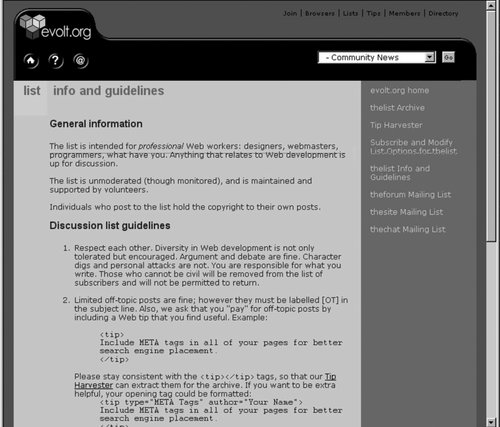 More ingeniously, evolt.org employs a policy that makes those responsible for off-topic postings "compensate" the community. Negligent authors are asked to include "tips," consisting of useful web development-related wisdom, in their off-topic postings. They typically comply; in fact, many authors compose tips just for the sake of it. Authors must mark up their tips in a way that enables evolt.org's automated "Tip Harvester" to index them for future use by the community. This is done with a simple open tag (<tip>) and close tag (</tip>). Tip authors are also encouraged to make use of additional markup options, such as <tip type="..."> and <tip author="...">. This markup supports impressive searching capabilities for a site that's not tightly controlled (Figure 21-3). Figure 21-3. These two simple metadata schemes make tips more easily searched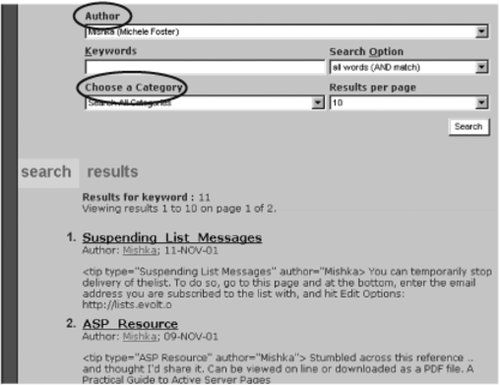 Economies based on compulsion don't survive for long. And evolt.org really doesn't have the infrastructure, much less the desire, to police communications and punish violators. That's why tips are so importantafter all, it's a given that we can't always stay on topic, and it's difficult to participate in a community without revealing any of your personal thoughts and feelings. Tips allow members to make up for their off-topic postings by contributing capital elsewhere in the community. In effect, tips are an examples of transactions in evolt.org's economy; they enable members to "pay" for their participation. And what's considered a plague in many other community discussion lists is transmogrified into a winwin situation in evolt.org's online community. 21.3.2.3. "Published" articlesArticles represent a major investment in the evolt.org economy, both for authors, who are expected to put significant effort into writing them and receive recognition in return, and for evolt.org itself, which is often measured by the quality of such articles. Additionally, evolt.org accords articles prime real estate on the site's main page, as shown in Figure 21-4. Figure 21-4. Recent articles occupy roughly 75 percent of evolt.org's main page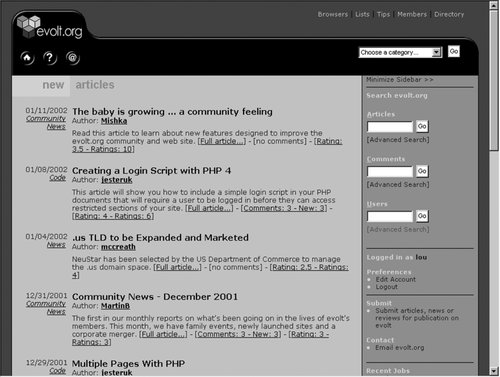 And evolt.org makes the investment equally risky for authors by prominently featuring readers' comments and ratings. This enables other readers to quickly determine how their peers are reacting to a particular article. These comments and ratings help evolt.org assure a degree of quality in its articles. Table 21-2 further explores the capital being exchanged in this content "transaction."
As authors create content over time, they can accrue more capital. This is reflected on article pages, where "cubes" and other cumulative information are displayed, as well as on authors' biographical sketches in the evolt.org member directory. Cubes are simply graphical representations of how prolific an author's output is. The cube in Figure 21-5 shows that Mishka has authored one to five articles. The sidebar on the right shows us that she has in fact written exactly five articles, which have been rated 54 times at an average score of 3.86 (on a 15 scale). And there's a cute photo to boot. Figure 21-5. Cubes give a sense of who authors are, how prolific their output is, and how good it is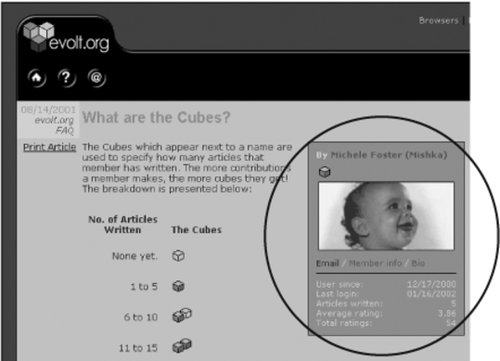 This information is useful to readers, who can quickly judge the quality of the author's output; the photo and links to email address and other author information serve to personalize her. By making authors more familiar to readers, evolt.org's information architecture may help increase the sense of community that reading an article brings. It's also helpful to authors, whose initiative to contribute articles (not to mention their self-esteem!) may be driven by knowing that evolt.org colleagues are reading their articles, posting comments, and reacting strongly enough to rate the articles. (Writing with an audience in mind is a wonderful author motivator.) 21.3.2.4. Biography listingsShould readers wish to learn more about an author, or if members want to know more about one another in general, evolt.org provides more detailed biographical information in its member directory. Directory pages include member-entered information (e.g., email address and brief bio), and automatically display their contributed tips and articles with reader comments and ratings (Figure 21-6). Although evolt.org hasn't chosen to do so, it might also be useful to link to a member's recent discussion-list postings. Figure 21-6. Member directory records serve as the "main page" for evolt.org members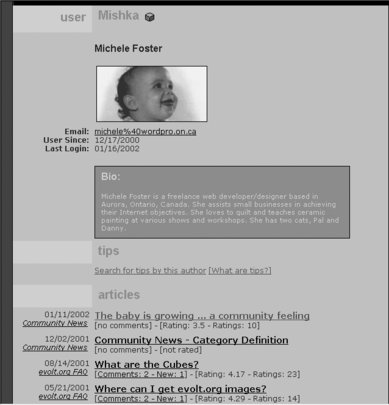 21.3.2.5. New venturesOne of the great benefits of this era of cheap and powerful information technology is that, well, information technology is cheap and powerful! Cheap and powerful enough that a free community site like evolt.org can make it available as a sort of "venture capital" to its more entrepreneurial members. This is the goal of members.evolt.org (m.e.o.): it serves as a development environment or "sandbox" for evolt.org members. It provides members with access to such web development essentials as ColdFusion, MySQL, Perl, PHP, Python, server-side includes, JSP and ASP capabilities, FTP, POP3 email, and, of course, disk space (currently 15 Mb per person). Instead of serving as an ASP or hosting service for operational sites, m.e.o. allows members to hone their web development expertise by working on experimental projects. Figure 21-7 shows a list of the projects that were being developed in the m.e.o. skunk works (which is unfortunately now defunct). Figure 21-7. The members.evolt.org area is home to an eclectic set of projects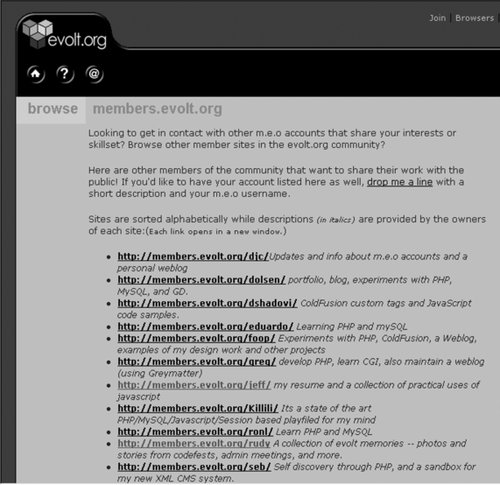 What does evolt.org get out of making all these goodies freely available? Besides goodwill, m.e.o. also inspires members to be entrepreneurialto develop new concepts that might serve the greater good of the evolt.org membership. One evolt.org administrator describes m.e.o. as akin to a "government grant for scientific research," and that investment has started to pay dividends. One member's coding experiment has evolved into a live directory that allows members to contribute to a growing collection of web development resources (see Figure 21-8). Figure 21-8. The Directory, one of m.e.o.'s successful progeny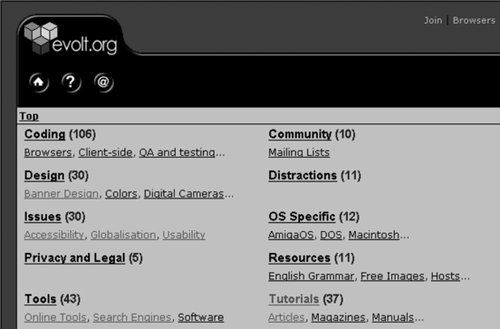 The evolt.org community also spawned the creation of a well-regarded archive of browsers, shown in Figure 21-9. The Browser Archive is handy for web developers who want to download copies of various browsers for testing their designs. Figure 21-9. The Browser Archive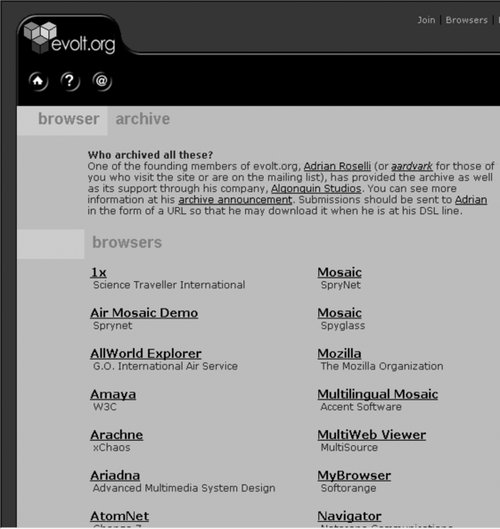 21.3.2.6. Decision-makingDecisions regarding evolt.org's direction are another type of transaction in the evolt.org economy. Initially, the site placed decision-making in the hands of administrators, many of whom were founders of the community. In their Godlike role, admins created the rules, roles, economy, and infrastructure that allow evolt.org to function on its own. As the community matured and the maintenance workload increased, decision-making became more democratized and was placed directly into the hands of evolt.org members. Two discussion lists were created specifically for decision-making: "theforum" (for the community's general direction and policy) and "thesite" (for decisions and work on the site's "back end"). This democratization and expansion of decision-making was possible and sensible once the size of the community and its members' sense of ownership and responsibility had reached a critical mass. In effect, evolt.org's creators set up the community's infrastructure and waited for members to "move in" and achieve the ability to self-police their community. When they moved in and began to feel comfortable and invested in the place, they could be expected to take on responsibility for guiding evolt.org's future. In this context, decisions are made informally: the community's size renders decision-making by consensus infeasible, and formal majority voting cumbersome. Despite this informality, the system works; members are neither shut out of decision-making nor overburdened by it. And despite shedding much of their decision-making power, admins still play an important rolethey approve or deny article submissions, and they have the ability to edit those submissions. They also answer user questions, help write the site's FAQs, settle ties, and occasionally represent evolt.org in public settings. This broader set of roles is the most demanding of any in evolt.org; however, it's also considered an honor since not everyone gets to be an admin. To be admitted to the "club," one must be invited by its current members. The honor typically falls to long-time members who have made active and visible contributions to the community. |
EAN: 2147483647
Pages: 194